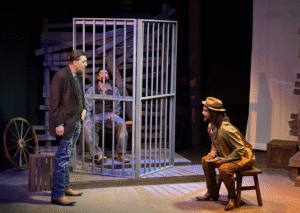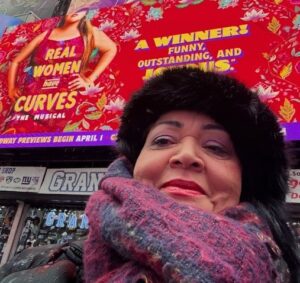A Special Edition for National Playwright Month
In celebration of National Playwright Month, we’re spotlighting a storyteller who has transformed the stage — and the world beyond it. Josefina López has made an extraordinary impact on theater and film, giving voice to those often overlooked and paving the way for Latinos to access and thrive in the arts.
Through her leadership at CASA 0101, a cornerstone of the Boyle Heights community, Josefina has created a space where Latinos can share their stories and bring their creativity to life. Her groundbreaking work — from Real Women Have Curves to countless original plays — has broken barriers and shown the world the richness and resilience of Latino identity.
From stage play to acclaimed film to Broadway musical, Real Women Have Curves continues to inspire audiences across generations. Josefina’s stories remind us that we are winning — in the roles we play, in the art we create, and in the lasting impact we make on the world.
We had the privilege of speaking with Josefina for this special edition. Read her insights and reflections below.

Eléctrico by Josefina López, directed by Corky Dominguez, lights up the stage at CASA 0101 Theatre. (Photo by Steve Moyer)
When authentic Latino experiences are amplified, our communities feel seen. You’ve likely received powerful feedback over the years. Can you share a moment or a story that deeply moved you or reaffirmed your purpose as a writer?
I had a white lady with her two young daughters come up to me with tears in her eyes, thanking me for writing Real Women Have Curves. She had just watched the musical version and was blown away by how much she learned about undocumented people and Latino culture.
She was so grateful her daughters got to see the musical and had so many questions and wanted to learn more about the plight of undocumented people.
She had never witnessed a piece of theater that changed her life like my show had done. We both cried together, connecting as human beings. We were no longer separate but human beings having compassion for one another.
Your play Real Women Have Curves has had over 100 productions, and your other works have been staged hundreds of times. Why do your stories continue to resonate so profoundly with audiences across generations?
Although Latinos are the majority in California, we are made to feel invisible by the constant disregard for our presence, our contribution to the economy, and the lack of representation. We are so hungry to see ourselves and our stories. I capture authentic portraits of Latinos and Chicanos so that audiences are touched by my ability to capture the dignity and beauty of our community. I also portray the resiliency of our people and use humor to display our courage and joy.
CASA 0101 has become a cultural home for the community in Boyle Heights. Looking back, what are some of the wins you’re most proud of in sustaining and growing this theater?
I am proud to be the first theater company to present the first play performed in English, Spanish, and American Sign Language, the first Latino LGBTQ Theater Festival in the U.S., and the first theater program in the U.S. to train Latinas to write, direct, and produce plays. We have given the first acting opportunities to the most Latino actors in Los Angeles.
For 25 years, we have taught playwriting and have mentored the most Latino playwrights in Los Angeles.

Josefina López takes a selfie in front of her iconic play, “Real Women Have Curves,” in New York.
What advice would you give to young writers and creatives from similar backgrounds, especially those who, like you, started as Dreamers or undocumented immigrants?
You are special because your immigrant drive is what makes this country the most successful and innovative. Remember that Latino immigrants are among the most successful immigrants in the history of this country, thanks to our incredible work ethic, dignity, and ability to see opportunities where others don’t.
I always remind myself that the success I’ve had typically takes three to four generations, but I achieved it in one because I grew tired of complaining about the lack of opportunities. I decided to create those opportunities for others. When you take a stand for others, you instantly gain the courage to take bigger risks and be bolder because you know the strides you make are not just for you but for all of your community, and that generosity of spirit is always rewarded by the Creator.
Cesar Chavez inspired generations to take action, and El Teatro Campesino carried that vision onto the stage through art and activism. How have the roots of Teatro Campesino and Cesar’s legacy shaped your work as both a playwright and activist?
When I learned about Luis Valdez using theater to change people’s minds and empower farm workers, I was moved by the power of truth in action. I learned how theater could help outsiders understand and sympathize with farm workers, and how the farm workers could see their plight as something universal, removing the shame of being a working-class person who understood they were being exploited and not to blame.
Luis Valdez’s work paved the path for me to see that I, too, could be a Playwright and I, too, could tell the stories of Latinos, women, and the undocumented. After watching Valdez’s I Don’t Have to Show You No Stinking Badges when I was 17, I was blown away by his message. I decided to devote my life to continuing his message and creating theater from our perspective, de-centering white men and their stories, which frame us as small and insignificant. I became aware of the plight of our people and realized that I needed to highlight the power and importance of women in our stories.
In your experience, how can local theater be used for healing, empowerment, and activism in Latino communities?
Theater teaches you that when we speak the truth and have others witness it, we liberate ourselves from shame, and the forces trying to oppress us no longer have power over us. It also shows you how in community, everything can be healed and transformed, because community is what everyone needs and wants to overcome any problem or challenge in life. Theater is a sacred space where we all take on the issues, pain, and suffering of a fellow human being, and we learn empathy. We bond and reconnect with our humanity and spirit. Through that sacred connection, we can become vulnerable enough to see a new possibility for a problem that we felt powerless to overcome.
The We Are Winning campaign celebrates progress in education, housing, media, and culture. In your words, how has theater served as a form of resistance and a catalyst for change—and what does “winning” look like in the arts today?

The official poster for Real Women Have Curves – Josefina López’s iconic play that continues to inspire audiences and uplift Latino voices.
Winning means that Latinx and women’s stories created by women and Latinx are celebrated on our stages year-round. We win when we make our community the protagonist of all our stories, reminding ourselves that we are the heroes and heroines of our story, as well as the story of California and this country. When we share stories about our Latinx community and women overcoming obstacles and achieving success, we demonstrate to the world that ¡Si Se Pudo!
Josefina López reminds us that storytelling is more than art — it’s activism, healing, and a declaration of presence. Her work, and the many voices she has uplifted, demonstrate how theater can spark empathy, inspire change, and reclaim narratives that are often silenced, reflected with dignity and pride.

